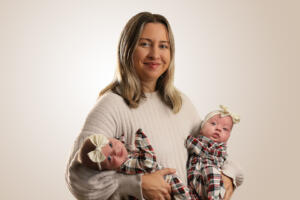The Clock is Ticking, but Technology and Tenacity Have Yielded Great Results
Degrees have been achieved, career established, and home obtained. Now, you’re ready to start that family you have always wanted. Well, not so quickly…
It’s become more common for women to put off having their first child, but many are unaware of the challenges they may face by waiting until age 35—known as an “advanced maternal age.” Women are born with a set number of eggs that decrease with each passing month, and by age 35, the reduced number of eggs makes conception more difficult.
Another consideration is the quality of those remaining eggs. There is a higher incidence of chromosomal abnormalities in the eggs of women as we age. As a result, miscarriages and rates of Down syndrome are higher. Additionally, as we age, pre-existing health problems such as uterine fibroids or endometriosis can make it harder to get pregnant.
As daunting as this all sounds, a healthy pregnancy may well be attainable. Here’s what you need to know.
Technology: Often the great equalizer
New technologies have allowed women to achieve healthy pregnancies into their 40s. These include:
- IVF: Assistive reproductive technology, such as in vitro fertilization (IVF), where a fertilized embryo is implanted in the woman’s uterus, increases a woman’s chance of conceiving.
- Egg freezing: I counsel women in their early to mid-30s who want a family in the future to consider oocyte cryopreservation or egg freezing. The procedure saves younger (and possibly healthier) eggs for later implantation through in vitro fertilization.
- Donor eggs: Many women find success using the eggs of someone younger.
Healthy mom, healthy pregnancy
Normal blood pressure, good nutrition, a physically active lifestyle, and a healthy weight all contribute to a greater likelihood of conception and a healthy pregnancy. Scheduling a preconception exam can help ensure you are in good health prior to getting pregnant.
Nourish baby’s brain
Start taking prenatal vitamins prior to conception for folic acid, an important element in the early development of a baby’s brain and nervous system. Often, the fetal brain and nervous system develop before the mother is even aware that she is pregnant.
Know when to seek help
For patients under age 35 with regular menstrual cycles, I recommend one full year of trying to conceive before I refer them to a fertility specialist. For those 35 and over, try for six months. At that point, I would complete a workup to discover any issues that could be inhibiting conception.
After age 35, women face greater difficulties in conceiving and carrying pregnancies to term. However, with careful and early planning, regular prenatal care, and the advances of science, having a healthy baby is still possible.
Dr. Dufreney is a board-certified OB/GYN at Women’s Health Specialists of CentraState. For more information, call 866-CENTRA7 (866-236-8727)





